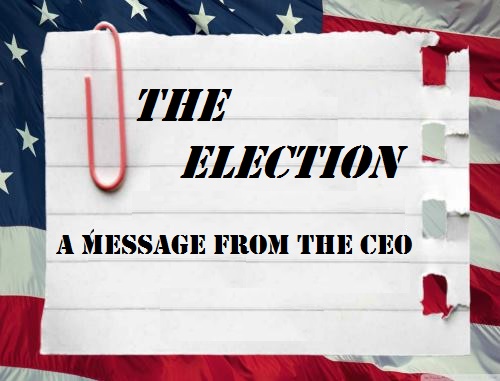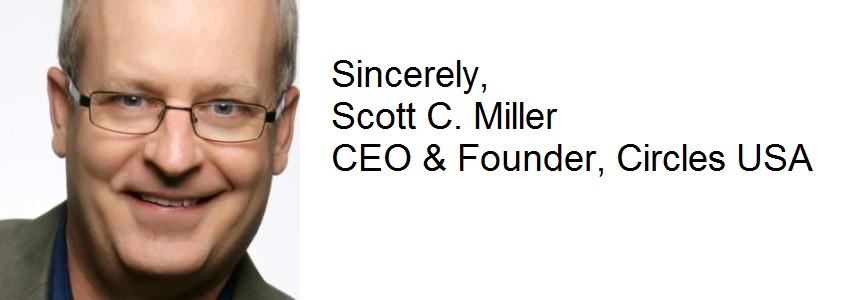 This week’s election has awakened me from a certain amount of sleepwalking. Even though I pay attention to national and global affairs, I often don’t take the time to register the weight of the seismic events affecting our world. I can be emotionally detached from the churning, suffering, and momentous upheaval that is the reality for so many people.
This week’s election has awakened me from a certain amount of sleepwalking. Even though I pay attention to national and global affairs, I often don’t take the time to register the weight of the seismic events affecting our world. I can be emotionally detached from the churning, suffering, and momentous upheaval that is the reality for so many people.
The emerging world economy, climate change, and propensity towards violence remain the biggest threats going forward. The election has stirred up an unprecedented upheaval in people’s minds and hearts about how we are going to handle these challenges.
The economy is going to require a massive new understanding of jobs, wages, benefits, taxation, etc. We are about to see huge shifts in what gets automated and what training and retraining humans will need to do in order to find work in the immediate and near future. Structures like Circles will be essential to support people who are taking on the changes, and even more so for people who feel unable to adapt with these rapid changes.
I have been worried about climate change for more than 15 years after participating in my first intensive weeklong conference on the topic. Certainly, there are enough people in power, not to mention virtually the entire scientific community, who fear the threat of inaction. Right? We will certainly find ways to hold our major corporations accountable to take more aggressive actions to reverse the trends before biosystems collapse and make life incredibly difficult for the millennials and their children. Right?
But what evidence do I have that humanity will not shoot itself in the foot by never addressing climate change appropriately, i.e. urgently, aggressively, and immediately? It seems we are likely to keep escalating the problem through the prolonged release of carbon emissions. We are likely to keep hopping on planes to visit exotic places and get in our SUVs to drive to the grocery store and buy products transported 1000 miles for our global palates and convenience. We are likely to keep buying a mind-boggling amount of new plastic gadgets we don’t need and return to our homes that are warmed by coal-burning plants.
It’s akin to catching the last call at the bar on the Titanic. Unfortunately, humans are capable of enormous denial in the face of danger. Most of us are never going to leave the carbon emissions bar until the captain of the ship says we are about to hit an iceberg. (Or in this case, there are no icebergs and the ocean now meets the shores of Ohio.) Unfortunately, biosystems have feedback delays, which means they won’t show the kind of warning signs that would get the attention of a carbon-intoxicated party crowd.
Violence is an unnecessary reaction to fear. We can and need to be better at how we communicate and solve problems with one another. Being nonviolent is a skill that can and should be taught to everyone. We need to show our children that it is best to take responsibility for one’s actions, stop blaming others, and be less addicted to the idea of winning at all costs.
There is a lot to reflect about. Many of us have the capacity and interest to think globally and connect the dots of history to potential scenarios of the future. But we must engage others who disagree with us in meaningful dialogue. We need to get much more active.
We can’t just whine about this with like-minded friends over lattes. We can’t just post it on Facebook. We need to power up through social media and political action to increase the public’s ability to think more flexibly and systemically. As our skills and tolerance for meaningful dialogue increase, we will be less tempted to hide our insecurity behind simple, convenient, and meaningless sound bytes. We will welcome a more rigorous assessment of the threats and opportunities in front of us. We will be more prepared to take comprehensive actions.
Life is complicated. As for my next steps, I am going to work on my social media skills so that more people are inspired, irritated and challenged by my thinking. I am going to listen more actively to opposing opinions and keep my mind and heart open even when I vigorously disagree. But mostly, I am going to lead a movement to end poverty in the US. This is something I can do that is causing a different culture to emerge–one that is more sustainable for everyone.
Conservatives and liberals must work together to find solutions to poverty. Stronger safety nets will be needed while we transition into a rapidly changing economy that will hopefully produce more and better jobs. New economic development strategies and powerful retraining programs must be deployed in our desperate rural and urban communities. Everyone should agree that leaving safety net programs should not cause a financial crisis. The current policies that produce the Cliff Effect must go.
I am going to keep doing what I do only I am going to do it bigger, louder, wider, and deeper. If there is one thing that inspired me from this election, it is GO BIG or GO HOME! We can and should end poverty in our nation, in our lifetime. That achievement alone would well equip us as Allies to our global neighbors and bring a new stability to the world.

